The Ultimate Guide to Wedding Dress Codes

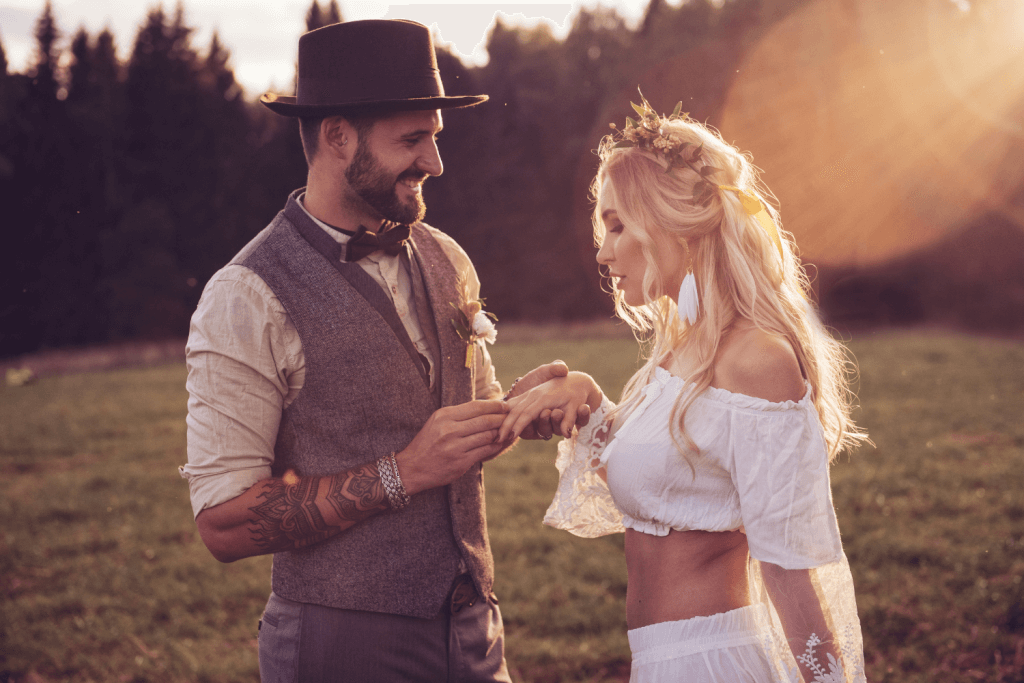
Trying to decide what to wear to a wedding can be tricky. Thankfully, wedding dress codes can help you narrow down your wedding attire as a guest.
But what do they all mean? White tie, black tie, semi-formal, destination? Deciphering a wedding dress code can feel like navigating a maze.
Don’t worry — we’re here to help. Check out our ultimate guide to wedding dress codes. Read on to unpack the 13 most popular wedding dress codes. This includes options for female, male, and non-binary or gender-neutral guests. Ready to get started? Let’s jump in.
What is a wedding dress code?
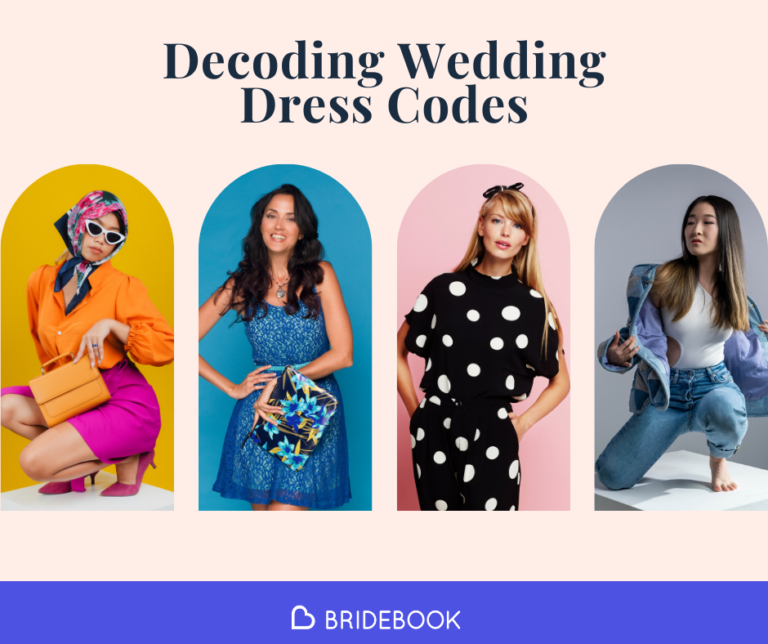
A wedding dress code is the dress code guidelines that the nearly-weds would like their guests to follow. This can either be a recommendation, for example, ‘There are lots of cobblestones at our venue, so we recommend no high heels!’ or a more stringent request, for example, ‘Please wear black tie only.’
Following the dress code will ensure you fit in with the nearly-weds’ vision and match the aesthetics of the day. It will also make sure you feel comfortable and enjoy the celebration to the fullest.
Do I have to follow a wedding dress code?
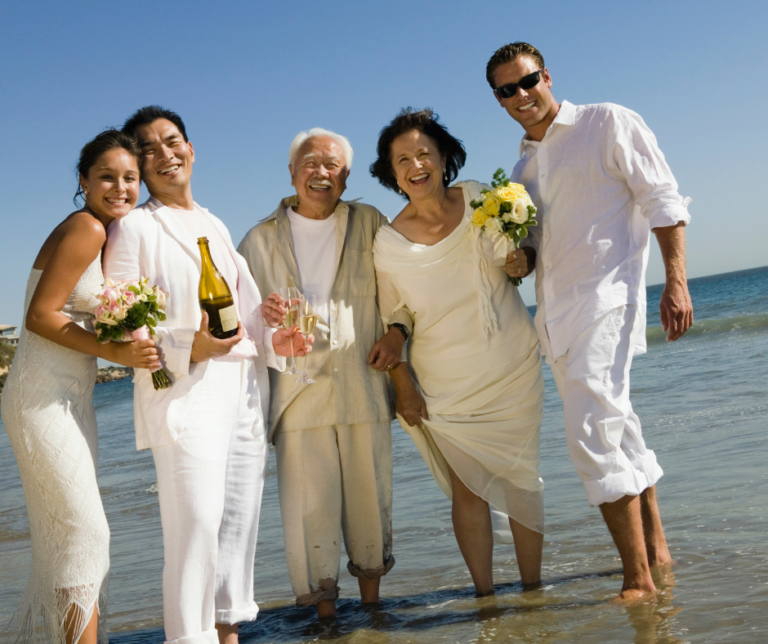
You don’t have to, but it’s recommended. It’s a simple way to show your appreciation to the couple for inviting you and show that you want to contribute to their big day. It’s a small gesture, but it goes a long way. Plus, it’ll ensure you’re comfortable throughout the day.
The ultimate guide to wedding dress code
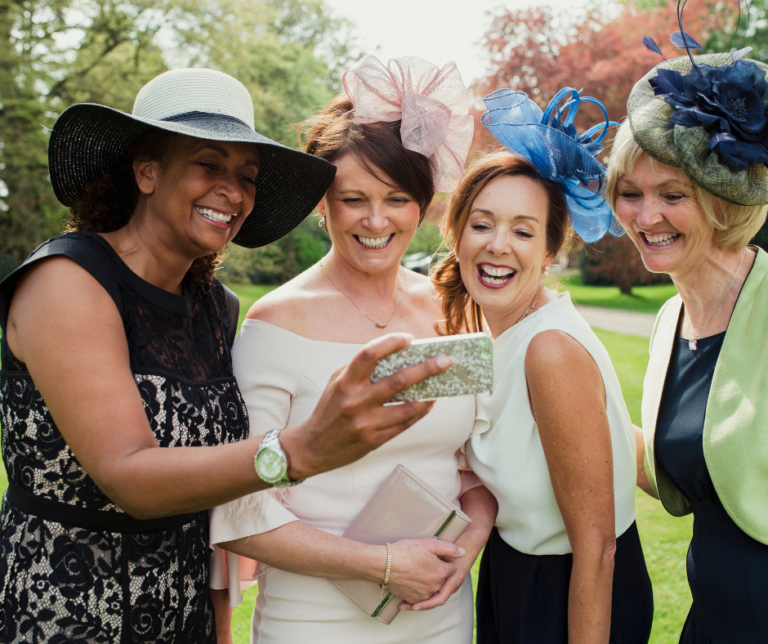
Ready to jump into the ultimate guide to wedding dress codes? Let’s get started.
White-tie
White-tie wedding clothing for guests is the fanciest of the fancy. It is formal, traditional, and usually reserved for the most sophisticated of occasions — perfect for a wedding.
White-tie ladies
Ladies’ white tie attire includes a full evening dress or evening gown, elbow-length gloves, heeled shoes, elegant jewellery, and a clutch bag. Your gloves should be a matching or complementary colour to your dress. Alternatively, you can never go wrong with white gloves.
White-tie men
Men should wear a black tailcoat with satin peak lapels, a waistcoat, a crisp white shirt, suit trousers, a bow tie, and a top hat. You should accessorise with cufflinks, a pocket square, and a pocket watch if you have one.
In terms of suit colour, stick to black. However, a very dark navy or purple may also be appropriate.
White-tie gender-neutral or non-binary
While traditional white-tie attire has been historically associated with specific gender norms, modern interpretations of formal dress codes are more inclusive.
A well-tailored suit is a great gender-neutral white-tie option. You could consider having a suit made and tailored to fit you perfectly and maintain an androgynous silhouette. This also means you have more freedom with the style and fabric. For example, you could pick a dark purple velvet or a suit lined with a beautiful pattern like paisley.
Black-tie
A black-tie dress code is a formal dress code a step down from white-tie. It’s associated with elegant, upscale weddings and other formal events.
Black-tie ladies
Ladies should wear a floor-length gown and heeled shoes for a black tie dress code. You can forgo gloves for black-tie. However, your outfit should convey a sense of formality and sophistication. You should accessorise with elegant jewellery and a clutch bag or wristlet.
Black-tie men
Men should wear a tailored tuxedo, black formal trousers, a crisp shirt, a bow tie, and a cummerbund in a complementary colour. You should accessorise with cufflinks and a pocket square.
Black-tie gender-neutral or non-binary
A tailored tuxedo is another solid choice for gender-neutral black tie attire. Choose a crisp shirt, a tailored suit jacket, a vest or cummerbund, tailored trousers, smart shoes, and polished accessories for a gender-neutral and formal outfit.
Formal or black-tie optional
Formal or black-tie optional is a dress code that gives guests more flexibility in what they wear to the big day. This dress code indicates that guests can wear black-tie if they choose. However, so long as they dress formally, they’ll fit in with the aesthetic of the day.
Formal or black-tie ladies
Ladies have the option to wear a full-length gown or a stylish cocktail dress. Accessories and jewellery should be classy, and you can opt for a low heel if you’d prefer. Fascinators or hats are also appropriate for formal or black-tie optional events.
Formal or black-tie men
Men can choose to wear a formal dark suit or take it up a notch with a classic black-tie ensemble. This includes a tuxedo, formal shirt, and optional accessories like a bow tie or cummerbund.
Formal or black-tie gender-neutral or non-binary
A tailored suit is a great option for formal or black tie optional events. However, you could also opt for a stylish jumpsuit, a classy wrap dress, or even well-coordinated separates like a flowy blouse and trousers. Keep accessories refined and sophisticated for a polished overall look. For example, dangling earrings, a long necklace, an antique pocket watch, or a clutch handbag are all great options to complete your look.
Cocktail
A cocktail dress code is a semi-formal style of dress typically chosen for events that fall between casual and formal. This dress code suggests a level of sophistication and style without the formality of black-tie attire.
The best thing about cocktail attire is that you can really have fun with it. You can dress in a brighter colour than you may have picked for black-tie, can include sparkles, or even use flashy fabrics like satin. This will add a touch of glamour to your look.
Cocktail ladies
Ladies have a ton of options for cocktail attire. From beautiful wrap dresses or a-line to a classic fit-and-flare, you really can wear whatever makes you feel comfortable. We recommend choosing a knee length cocktail dress or midi dress to match the occasion and wearing heeled shoes.
Accessories can include statement earrings, a stylish belt, or a pretty bag to complete the look.
Cocktail men
Men should opt for a classic suit in a dark colour for a cocktail wedding dress code. However, a cocktail dress code is the perfect opportunity to experiment with unusual suit colours and textures. If you aren’t comfortable in a suit, you could consider a well-fitted blazer paired with stylish trousers and a contrasting shirt.
Experiment with accessories like colourful pocket squares, bold ties, or even stylish cufflinks to inject personality into your outfit.
Cocktail gender-neutral or non-binary
The flexibility of cocktail wear means it’s a great choice for gender-neutral guests. You could wear a stylish jumpsuit, a co-ordinated skirt set, or even a tailored suit in a colourful fabric. Keep accessories light and neutral so as not to distract from your outfit.
Semi-formal or dressy casual
Semi-formal or dressy casual is a dress code that falls between casual and formal wedding guest attire. It is more sophisticated than everyday casual wear but doesn’t require the formality of black-tie or cocktail wear.
Semi-formal or dressy casual ladies
Semi-formal or dressy casual means you can opt for a flowy dress, smart separates, a pretty wrap dress, or just about anything that makes you look polished and put together. You can wear heels or flats, and accessories should be tasteful and appropriate. For example, a nice watch, clutch bag, or jewellery set.
Semi-formal or dressy casual men
Men should choose a well-fitted dress shirt in a solid colour or subtle pattern with dress pants in a complementary colour. You could also wear a blazer or sports jacket if the weather is chilly and accessorise with a smart tie and cufflinks.
Semi-formal or dressy casual gender-neutral or non-binary
You can’t go wrong with tailored separates, a stylish jumpsuit, or a button-down shirt with chinos. Flat, dressy shoes are the most appropriate. Avoid overly casual sneakers or sandals.
Casual
Casual wedding guest attire is more relaxed than semi-formal or formal options but still requires thoughtful consideration. The level of casualness can vary, so it’s important to take cues from the wedding invitation, venue, and time of day. Casual weddings usually happen in the summer, so it’s important to dress to keep the sun off.
Casual ladies
Try a sundress, a flowy maxi dress, or a casual skater dress in light or pastel colours for a casual wedding dress code. Floral prints or simple patterns work well for a daytime wedding. In terms of shoes, try a low heel, sandals, or pretty dress shoes. Accessories should be light and designed to keep the sun off your face if the wedding is outdoors. For example, a hat or visor. You could also try a woven bag for a summery touch.
Casual men
It’s perfectly acceptable to wear a polo shirt, casual button-down, or a smart shirt for a casual wedding. Pair with chinos, loafers or boat shoes, and a stylish watch and belt, and you’re good to go!
Casual gender-neutral or non-binary
Try pairing a loose-fitting shirt with dress pants, chinos, or a flowy skirt for the perfect, versatile gender-neutral wedding attire as a guest. Pair this outfit with slip-on shoes, loafers, or even clean, stylish trainers to strike a balance between comfort and sophistication.
Seasonal
Seasonal wedding guest attire will depend largely on the season. For example, you would dress differently for a spring wedding than you would an autumn wedding.
Seasonal ladies
Spring or summerLight fabrics, bright colours, and flowery dresses are all great options for spring or summer weddings. You could also try a summer suit or casual separates for a polished yet relaxed look. You can pair these with clean trainers or pumps and delicate accessories.
Patterned summer dresses tend to have a lot of white in them, so be mindful of this when selecting wedding clothing for guests. Guests should avoid wearing white wherever possible so they don’t overshadow the bride.
Autumn or winterWrap dresses, tasteful suits, or coordinated separates are all great options for an autumn or winter wedding. You’ll need a matching jacket to keep off the chill and sensible shoes to keep your feet warm. Stick to jewel tones, dark colours, and fur where appropriate.
Seasonal men
Spring or summerLightweight suits in breathable fabrics like cotton or linen are excellent options for a spring or summer wedding. Choose a suit in pastel shades, neutrals, or bright colours to capture the essence of the season. Pair it with a crisp dress shirt, a complementary tie, and slip-on shoes for a modern but relaxed look.
Autumn or winterYou can’t go wrong with a classic dark suit for an autumn or winter wedding. Heavy materials like wool or velvet can add extra warmth, and brogue or Oxford-style shoes are perfect for keeping your feet warm. You’ll need a longer coat to stave off the cold. However, these look quite fashionable.
Accessorise with a watch, cufflinks, and a coordinating pocket square for a classy, put-together look.
Seasonal gender-neutral or non-binary
Spring or summerWide-leg trousers, a flowy top, and clean trainers give a modern but sophisticated wedding look. Stick to neutrals, pastels, or light colours to complement the fresh and vibrant atmosphere of a modern wedding.
Autumn or winterSwap the lightweight fabric for warmer materials like wool or velvet. Wide-leg trousers in a deep, autumnal colour such as burgundy, forest green, or chocolate brown can add a touch of seasonal elegance. Pair them with a long-sleeved, flowy top in a coordinating hue or a rich jewel tone.
Layering becomes essential in cooler weather, so consider adding a tailored blazer or a stylish coat that complements the colour scheme.
Tropical or destination
Tropical or destination weddings bring relaxed vibes, patterned clothing, and casual footwear. Check the weather before you travel and pack accordingly!
Tropical or destination ladies
Flowy sundresses, maxi dresses, or jumpsuits are all perfect choices for ladies attending a tropical or destination wedding. These styles not only capture the laid-back and breezy ambiance of the location but also provide comfort in warmer climates.
Try a bright colour or tropical print to really lean into the aesthetic of a destination wedding. Footwear should be practical yet stylish. Consider strappy sandals, espadrilles, or even elegant flip-flops for beach weddings. Going barefoot, especially for beach ceremonies, can also be a charming and authentic choice.
Tropical or destination men
Lightweight and breathable clothing options are perfect for a destination wedding. Consider pairing these with tailored shorts or chinos for a laid-back look. Tropical prints, vibrant colours, and pastel hues add a playful touch to your ensemble.
Footwear should be comfortable and practical. Try loafers, boat shoes, or even stylish sandals to complement the tropical setting.
Tropical or destination gender-neutral or non-binary
A flowy jumpsuit, wide-legged pants, or any clothes with a relaxed fit will contribute to the laid-back feel of a tropical or destination wedding. Neutral, light, or bright colours are all great choices for a beach or outdoor wedding.
Footwear can include comfortable options like espadrilles, slip-on shoes, or sandals. Ensure they are suitable for the terrain and venue, especially if it’s an outdoor setting.
Come as you are
A ‘come as you are’ dress code means that guests are free to wear whatever makes them feel good, whether it’s casual, semi-formal, or even formal attire. The best thing about ‘come as you are’ is that you often don’t have to buy anything new. Instead, you can reuse items already in your wardrobe and save your money!
Come as you are ladies
Although ‘come as you are’ indicates a laid-back affair, you should still try your best to look nice and respect the formality of the big day. You can’t go wrong with a knee-length dress, low heels, and tasteful accessories.
Come as you are men
Try combining a crisp shirt with dress trousers and a complementary tie for a classic but sophisticated look. A well-fitted blazer or a tailored suit jacket can add a touch of refinement to the ensemble, elevating it to a more formal level.
Come as you are gender-neutral or non-binary
‘Come as you are’ for gender-neutral or non-binary individuals is an inclusive and open invitation that prioritises self-expression and comfort over traditional gender norms. Feel free to express yourself authentically with your favourite outfit, jewellery, and shoes.
Vintage or retro
A vintage or retro-themed wedding is the opportunity to channel the timeless elegance of a time gone by. The invitation should specify the vintage era the nearly-weds are going for. For example, 60s, 70s, or 80s. However, if it doesn’t, consider the overall aesthetic of the venue, the couple’s personalities, or any subtle clues in the invitation that might hint at the desired era.
Vintage or retro ladies
Classic silhouettes like A-line or tea length are perfect for adding a vintage flair to your outfit. You should consider patterns like polka dots, check, or even bright, solid colours paired with black accessories. Pearls, gloves, and a small fascinator can also help add a vintage touch to your outfit.
Vintage or retro men
Choose suits that reflect the fashion trends of the era. For example, slim-cut suits with narrow lapels for the 60s, or wide-legged trousers and bold patterns for the 70s. Hair was a big thing for men in years gone by, so try embracing a Grease-style hair-do for the 50s or a neatly combed style for the 40s. Skinheads were popular in the 80s and 90s. However, this may be drastic for just one day!
Vintage or retro gender-neutral or non-binary
Opt for gender-neutral or androgynous clothing styles that were prevalent in the chosen vintage era. For example, tailored suits with versatile silhouettes, jumpsuits, long skirts, and a-line dresses all work well for a classic, retro look.
Cultural attire
Dressing in cultural attire is the perfect opportunity to learn more about the culture of the nearly-weds. However, it’s important to draw the line between being respectful and appropriating the culture.
Your specific dress will depend entirely on the culture of the bride and/or groom. For example, you’d dress differently for a Korean wedding than you would for a Middle Eastern wedding.
If you have any questions about what you should wear to a cultural wedding, we recommend discussing it with the couple directly. As it’s their culture, they’ll be able to advise you on what would be appropriate to wear and how you should style yourself.
Art Deco
Art Deco is a distinct and vintage fashion style known for its sleek, modern, and glamorous aesthetic. Think the roaring 20s or The Great Gatsby, and you won’t go far wrong.
Art deco ladies
Choose dresses with distinctive Art Deco patterns like geometric shapes, chevrons, or zig zags. Sequins, fringe, dropped waists, and beadwork are also characteristic of classic 20s styles.
Avoid wearing heels. Instead, opt for ballet flats or Mary-Jane style shoes. Accessories should be bold and flashy. Think headbands, chandelier earrings, beaded clutch bags, and long bead necklaces.
Art deco men
Tailored suits with contrasting colour combinations were a classic choice for 1920s dressing. Think black and white, navy and cream, or deep jewel tones. You could also incorporate geometric patterns into your clothing for added flair. For example, patterned ties, pocket squares, or vests with Art Deco-inspired designs.
Art deco gender-neutral or non-binary
Choose tailored suits with a modern, androgynous cut. Look for suits that feature clean lines and a sleek silhouette. Experiment with two-piece or three-piece suits in contrasting colours, embracing the bold and geometric style of Art Deco.
Alternatively, a glitzy jumpsuit or long, flapper-style dress with fringe can provide an equally stunning and gender-neutral interpretation of the Art Deco aesthetic.
Colour-coded
It’s becoming more common for couples to request guests stick to a specific colour scheme, rather than setting a specific dress code. This gives guests the opportunity to express their personal style while contributing to a cohesive wedding aesthetic.
Colour-coded ladies
How you decide to apply the colour-coding request is completely up to you. For example, if the theme is blue, you could opt for a blue dress, blue shoes, a blue handbag, or even blue jewellery.
Colour-coded men
Again, if the dress code is blue, you could wear a blue suit, blue shirt, blue shoes, or a blue tie. We recommend you don’t dress entirely in blue. Instead, try picking one central blue item and building a complementary outfit around this. For example, blue trousers with a complementary shirt.
Colour coded gender-neutral or non-binary
Try a tailored suit, jumpsuit, wrap dress, or mix and match ensemble in the designated colour. You can also match your makeup, jewellery, or accessories to the colour scheme for an inclusive look.
The bottom line on wedding dress codes
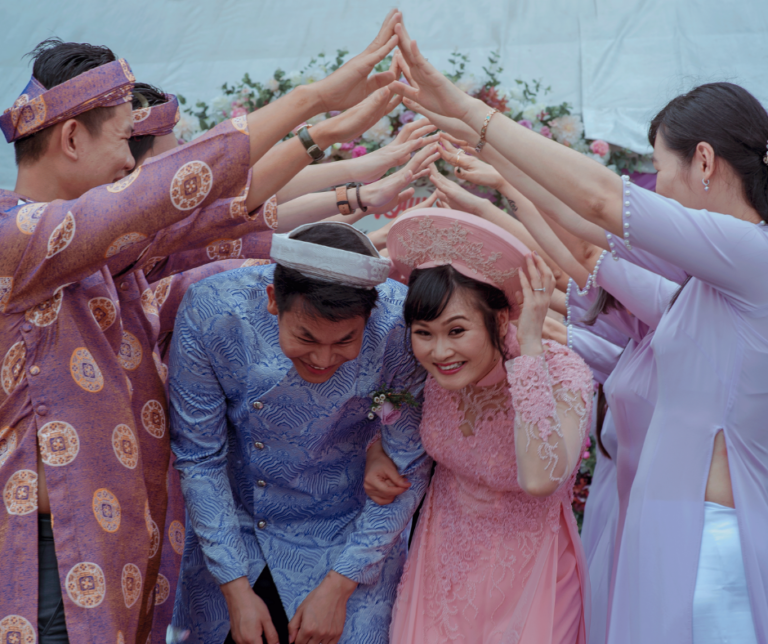
Although wedding dress codes give guidelines for wedding clothing for guests, there’s still a lot of flexibility within these parameters. Instead, think of them as a framework within which you can showcase your unique style, ensuring you both honour the couple’s vision and feel authentically yourself.
Within the defined parameters of formal, semi-formal, casual, or themed attire, there’s room for personal expression. Whether it’s choosing a gown that perfectly complements the colour scheme or adding a touch of flair with unique accessories, you have the freedom to tailor your outfit to reflect your personality.
Remember, the essence of dressing for a wedding is to celebrate love, joy, and the union of two individuals. So, whether you’re donning a classic black-tie ensemble or opting for a more casual look, the key is to feel comfortable, confident, and ready to revel in the festivities.
And if you’re still struggling to figure out the perfect wedding ensemble, check out our handy guide on what to wear to a wedding as a guest.
Frequently Asked Questions
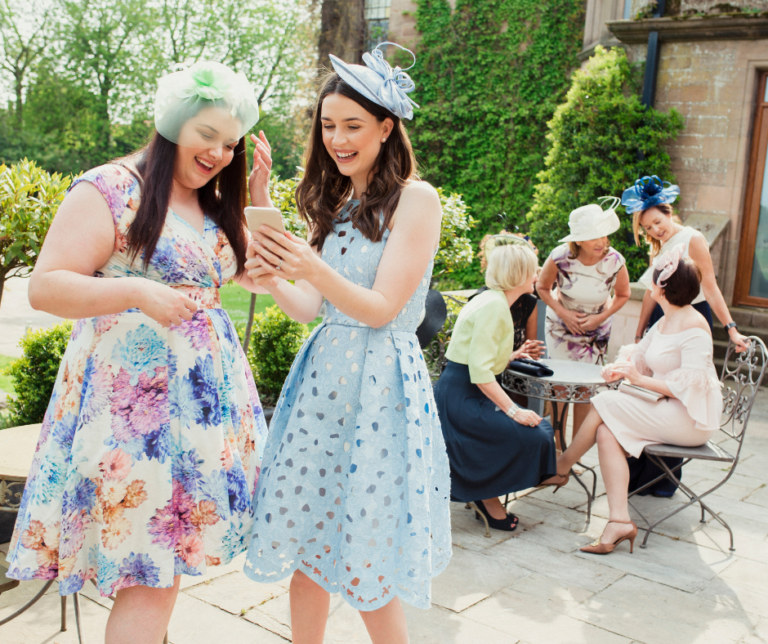
What is the best dress code for a wedding?
The best dress code for a wedding is whatever best represents you and your partner. If you’re laid back, try a ‘come as you are’ dress code. If you’d like to throw a more formal affair, opt for black- or white-tie.
How do I choose a wedding dress code?
Choosing a wedding dress code comprises a lot of aspects. This includes your vision, the formality of the event, the venue, and any theme you had in mind. Take an inventory of the energy you’d like to feel on the day and translate that into your dress code.
Is it OK to wear black to a wedding?
It is acceptable to wear black to a wedding, especially if it’s a modern wedding, a black tie wedding, or a colour-coded wedding. However, we recommend that you avoid wearing black for spring or summer weddings, outdoor weddings, or destination weddings.
You Might Also Like…
- What to Wear to a Wedding as a Guest? Dos, Don’ts and Top Tips
- Introduction: Wedding Guest Dress Etiquette
- What to Wear to a Wedding Reception
- What to Wear to a Winter Wedding
Happy Planning!

